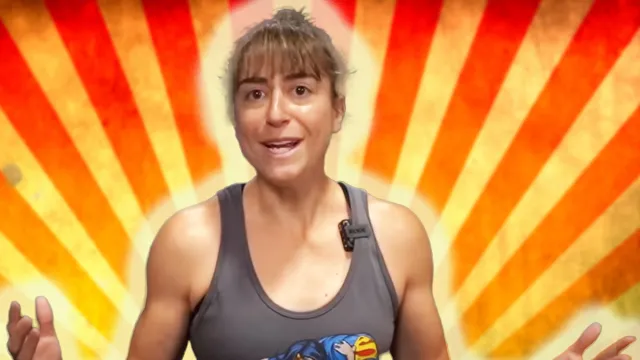7 Proven Tips to Build Muscle After 45 (And No, It's Not Too Late)
Cori Lefkowith of Redefining Strength is a fitness expert and social media influencer whose mission is to help with "building habits that seamlessly become a part of your lifestyle, ultimately reshaping your identity," she writes in her bio. In a new post, she blasts the fallacy that "I am too old to gain muscle," she says. "Stop lying to yourself. Stop giving yourself an excuse not to work hard and move forward. Because while our body needs and goals do change as we get older, and yes, it a hundred percent becomes harder to build and retain the muscle, we can still achieve fabulous results and build muscle at any and every age," she says.
What Worked When You Were Younger Won't Work When You Are Older
"The reason we don't see the results we want as we get older is because we cling to improper dieting and workout practices that we may have gotten away with when we were younger. But at every stage of life, we need to be adjusting our fueling and our training. Nothing works forever," she says in the video.
Diet and Training Should Evolve
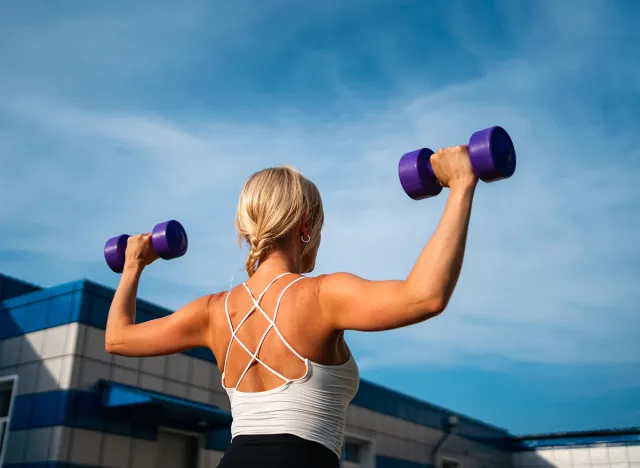
"Our body and lifestyle are constantly evolving, and so should our diet and training habits," she continues, "to meet us where we're currently so we can always move forward and be functionally strong till the final day on this planet. That's why I wanna share with you seven tips to maintain your lean muscle and even gain muscle as you get older."
Tip 1: Use It Or Lose It

Tip number one is to use it or lose it. "So often, the reason we see more dramatic shifts in body composition and lose more muscle mass as we get older is because we've stopped doing what makes us fitter and stronger. We simply accept decline, and we use age as an excuse. Instead of finding ways to challenge ourselves, things get harder. We may feel more awkward with balance moves. We may feel like we even recover slower. We may even dislike coordination moves because they're uncomfortable. Even mainstream media has been telling people to stop doing what kept them strong in the first place, but if you don't use it, you'll lose it," she says.
Do Moves That Challenge Your Coordination
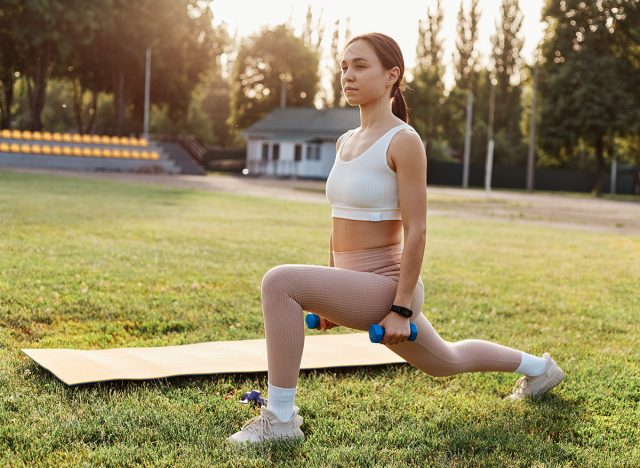
"If you wanna keep your mind-body connection strong, which can lead to better muscle hypertrophy or muscle gains, you've gotta do moves that challenge your coordination. And if you not only wanna gain muscle but stay functionally strong and avoid falls, you have to do those awkward balance moves. Use it or lose it. Keep challenging yourself and training those movement patterns in the gym, so you move better in everyday life," she says.
RELATED: I Got Into the Best Shape of My Life at 50 by Following These 6 "Basics"
Tip 2: Stop Dieting

Tip number two: stop dieting. "Muscle helps keep our metabolic grade higher. It helps us burn more calories at rest and stay leaner. As we get older, we become less able to utilize protein as efficiently, making it even harder to build and retain lean muscle mass. But this is why it's even more key. We stop dieting in extreme deficits," she explains.
Don't Continue Cutting Calories

"While it can feel harder and harder to lose any weight we've gained, so we feel like we need to turn to larger and larger calorie deficits. This ultimately sabotages our results. It leads to more muscle mass being lost in the process of us trying to lose weight, which only leads to metabolic adaptations and worse body composition," she says.
It Makes It Harder to Lose Weight
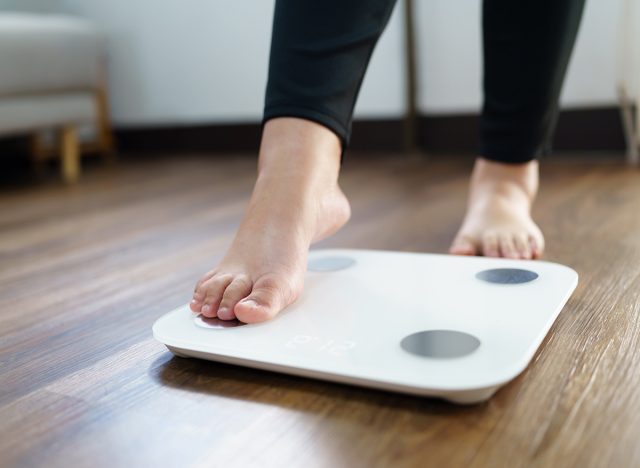
"It leads to us actually making it harder on ourselves to lose the weight and keep it off. Plus, metabolic adaptations mean we burn even fewer calories when we are at rest. This leads to us then slashing our calories lower and lower to try and keep losing, perpetuating the horrible weight-gaining cycle as we get older," she says.
Work on Fueling Lean Muscle Mass

Instead, you should "focus on fueling" that lean muscle mass. "We need to focus on macros first in a very slight calorie deficit so we can help ourselves retain that lean muscle. Even as we wanna lose fat, we may even find we first need to retrain our body to eat more so we can build that lean muscle with a small calorie surplus before we even consider creating a slight deficit to lose," she explains.
Tip 3: Do Moves That Challenge You
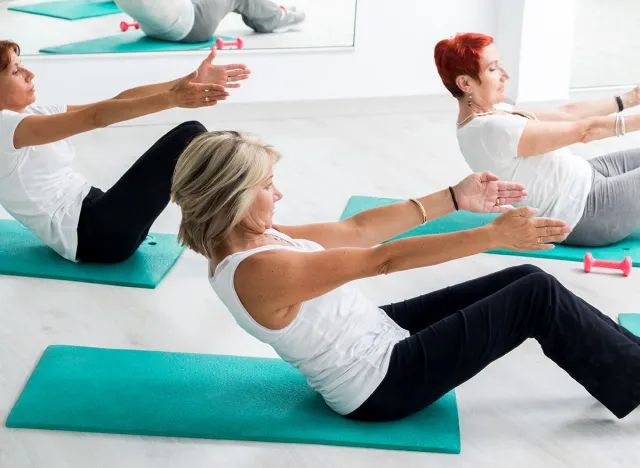
Tip number three: do moves that challenge you. "Many of us have heard that strength training is key to gaining muscle, especially as we get older, and it is by challenging our muscles we force them to rebuild and grow stronger. It's why we don't wanna fear heavy lifting as we get older," she says.
RELATED: I'm 50+ and These 7 Fat-Blasting Habits Keep Me in the Best Shape of My Life
Start Lifting
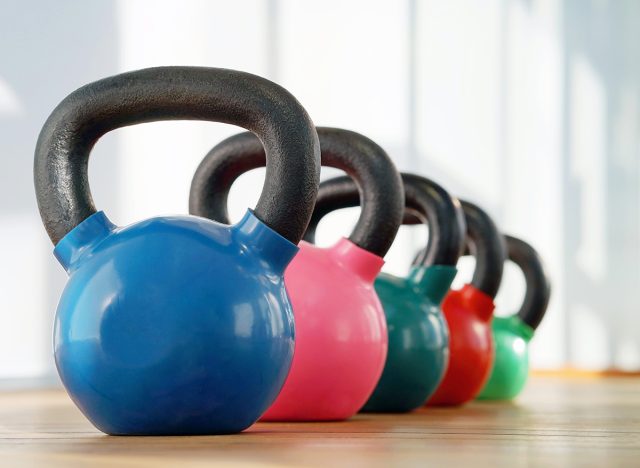
The key is recognizing what lifting heavy is. "For us, it may mean body weight training starting out, especially if you haven't trained before or haven't trained consistently in a while, or maybe using resistance bands or dumbbells over barbells. The key is not fearing loads and truly challenging yourself instead of going lighter just because you've hit a certain age. Fitness is about ability, period. We always have to meet ourselves where we're at," she says.
Don't Avoid "Awkward or Uncomfortable" Moves
"This also means we can't avoid awkward or uncomfortable moves that challenge our mind-body connection. Neuromuscular efficiency, or the ability to recruit muscles quickly and in the right sequences to perform movements, is key to us moving well and improving our reaction times and coordination in everyday life. Not to mention that the ability to recruit muscles quickly and muscle activation will also improve your muscle hypertrophy results," she says.
Improve the Mind-Body Connection
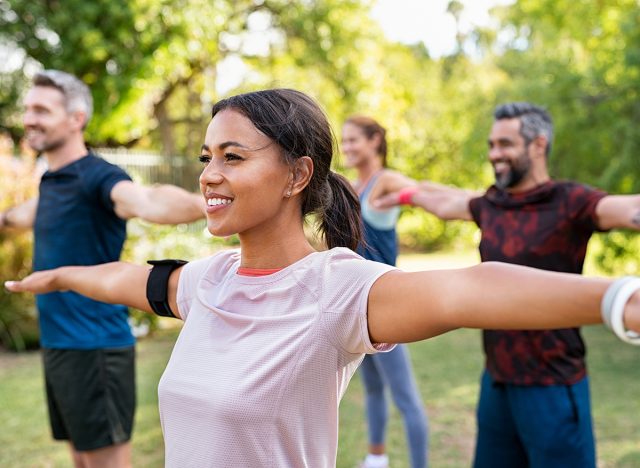
"So if you wanna be able to gain more muscle, you wanna improve that mind-body connection with moves that challenge your balance and your coordination while also challenging yourself with loads," she adds.
Tip 4: Increase Your Protein Portions Per Each Meal

Tip number four: increase your protein portions per meal. "As we get older, we can develop anabolic resistance, and we are less able to utilize protein efficiently. This means we actually need to increase our protein intake, especially when we're training hard and lifting to build muscle because our muscles don't respond by increasing muscle protein synthesis in the same ways when we're younger," she says.
Aim for 20 to 30 Grams Per Meal
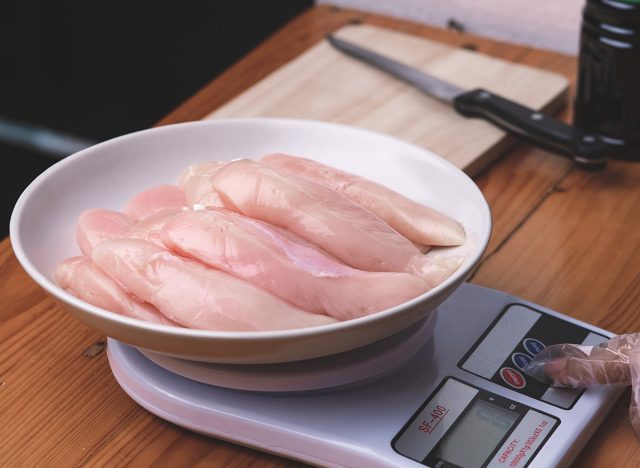
"Increasing a portion of 20 grams of protein to 30 may be super key, and if we're training harder, you may see an even better benefit from 40 grams, especially after a hard training session," she says. "However, the reason I don't just say increased protein intake overall is because as we get older, we can also often see a decline in our appetite."
It Can Be Hard to Eat a Lot of Protein in One Sitting
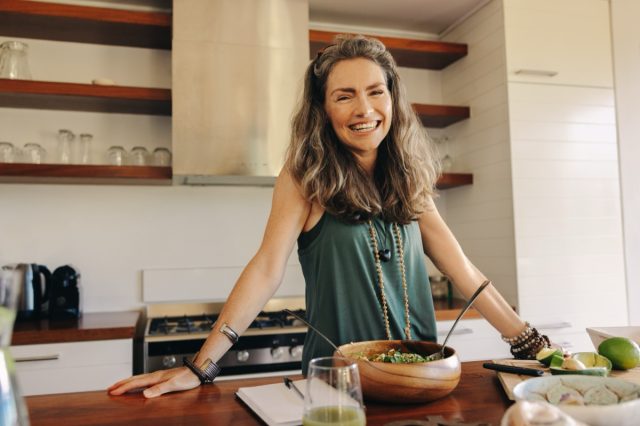
"This decline in appetite can be purely age-related, but it can also be based on how we fueled in the past to try and lose weight with more extreme deficits. It can also be hard to eat a ton of protein in one sitting because it can make us feel fuller," she says.
RELATED: 20 Superfoods for People Over 50
Breaking Up Protein Intake Will Help You See Results

"By increasing our intake each meal over trying to get in a ton of protein at one meal, and even adding in a pre and post-workout snack that is protein-centric, we can break up our protein intake to see results," she says. "You may even find that you can see an added benefit from BCAA supplementation during your workouts as leucine is especially critical to stimulating muscle protein synthesis. There can also be some benefit of breaking up your protein intake to keep a positive protein balance multiple times a day to promote better muscle growth."
Tip 5: Do Mobility Work
Tip number five: do your mobility work. "We can see changes in our recovery, and aches and pains can feel like they're adding up so much more as we get older. Too often, we simply blame our age for over-recognizing the movement compensations and balances, overuse, and overload that have been occurring for years and that we haven't addressed. But whatever the reason, we can't ignore these issues if we wanna be able to train hard consistently to see results," she says.
Mobility Work Will Help You Move Better and Recover Faster
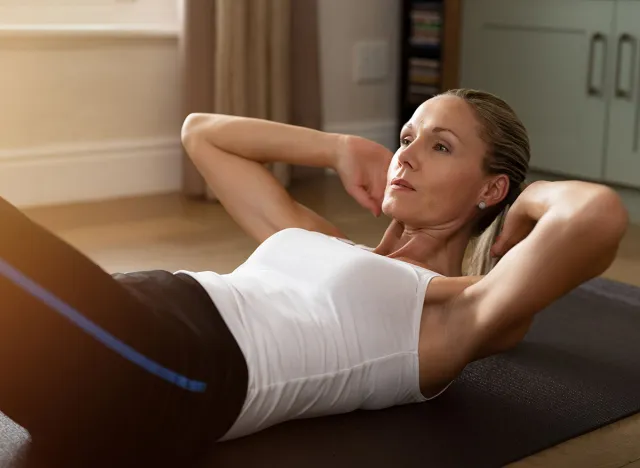
Mobility work "can help us move better and recover faster, even helping us better manage chronic inflammatory conditions that could fight our muscle gains so we can train consistently and challenge ourselves to build that lean muscle without proper recovery," she says. "We end up training to a point of diminishing returns where we're just constantly beating our body down over allowing for proper recovery and growth."
When We Rest, We Rebuild

"When we rest, we rebuild," she says. "We do this mobility work in every warm up so we can train to build that lean muscle more efficiently. You'll be surprised by how much even five to 10 minutes of mobility work a day helps you train harder without needing extra days off to recover."
6. Be Strategic in Your Meal Timing

Tip number six: be strategic in your meal timing. "I say this as a person who personally loves intermittent fasting as a meal timing. Fasting can backfire when gaining muscle is your goal, especially if you're a hard gainer. And as we get older, we have to realize that fasting and fasting training may hinder us from gaining muscle. As in a fasted state, your muscle protein balance is negative. Basically, you break down more muscle than you build," she says.
Don't Train Fasted
"So we put ourselves at greater risk for losing muscle the more we put ourselves in this negative protein balance. Not to mention, when you train fasted you don't necessarily have that readily available stored fuel. You need to truly push hard during a session and rebuild after you've created the muscle tissue damage," she says.
Consider a Pre-Workout Meal
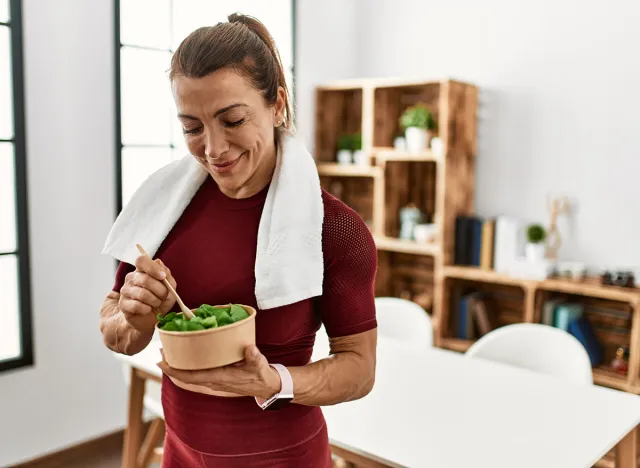
"So consider including a pre-workout meal with protein to have amino acids readily available in your system, and even a carb source for immediate fuel to allow you to push harder in your sessions without fatigue," she says. "Studies have found the resistance exercise combined with amino acid ingestion elicits the greatest anabolic response. It may assist the elderly in producing a youthful muscle protein synthetic response, provided sufficient protein is ingested following exercise. This post-workout protein consumption can even help you improve your recovery. So you can include more hard training sessions over the week."
Tip 7: Stay Active on Recovery Days
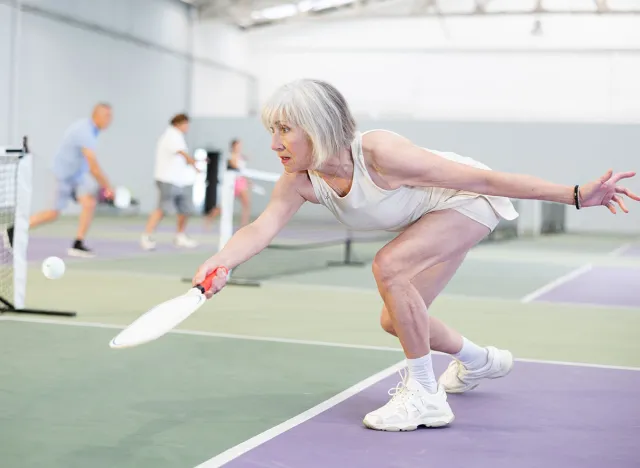
Tip number seven: stay active on your days off recovery. "And rest days don't have to be do-nothing days. And the more we can actually use these days to prep our body to move better during our training sessions, the better off we'll be," she says.
RELATED: 10 Swimming Tips to Lose 45 Pounds Like I Did
Walk or Do Mobility Exercises
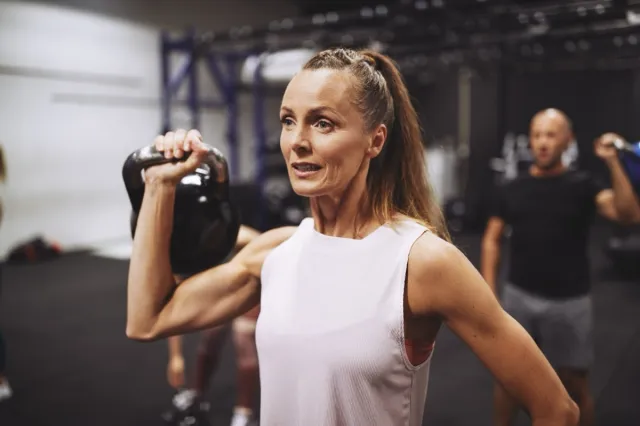
She recommends including five to 10-minute mobility routines or going for a long walk. "Honestly, walking is one of the most underutilized tools we have to save functionally stronger and improve our body composition even as we get older. Walking can help us avoid unwanted fat gain, keep our aerobic base strong, and even help us recover from previous training sessions without being catabolic to our muscle mass, she says. "Unlike more intense forms of steady state cardio, walking can also be a great way to de-stress and help our mind and body recover. So, as much as it can be hard to take a day off, your body needs it. Your muscles repair and rebuild when you give them time to recover. But to stay active, don't be afraid to include light movement and mobility work on those days off. You may be surprised by how much even this light activity helps you sleep better."
Bottom Line: You Can Build Muscle Mass at Any Age
"We can and should focus on building muscle at any and every age. We are never too old to see results, and our workout routine and diet should always be based on our needs and goals, meeting us where we are currently and our age. That simple number should never determine what we can or can't do. We have to remember that if we want to stay strong, it really is a case of use it or lose it. So use these seven tips to help you feel lean, strong, and fabulous till your final day on this planet," she concludes. And if you enjoyed this article, don't miss 12-3-30 Walking Method: 20 Proven Tips to Lose Weight Faster.
